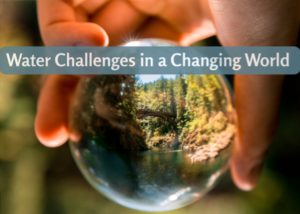
Water Challenges in a Changing World Seminar Series
We invite you to join us for our “Water Challenges in a Changing World” seminar series of the Birmingham Water Centre in collaboration with the Birmingham Institute for Sustainability and Climate Action (BISCA). The series of hybrid seminars offers interdisciplinary perspectives on global water challenges by a field of international research leaders. If you would like to be added to our mailing list to receive these calendar invites, please contact – s.hira@bham.ac.uk.
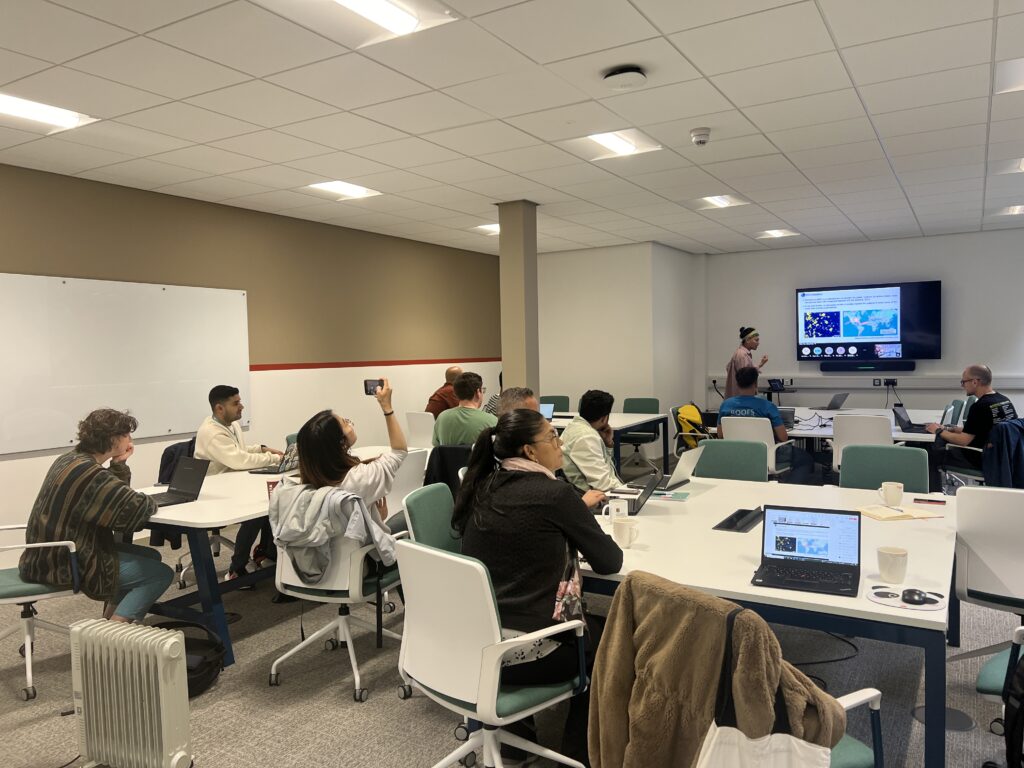
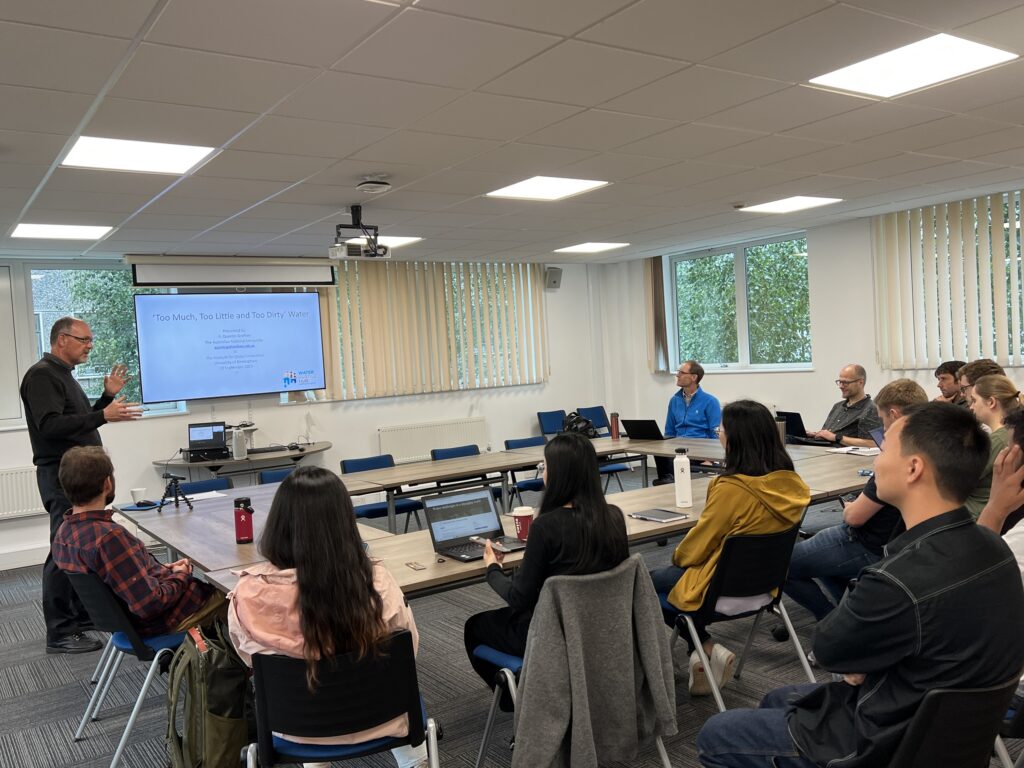
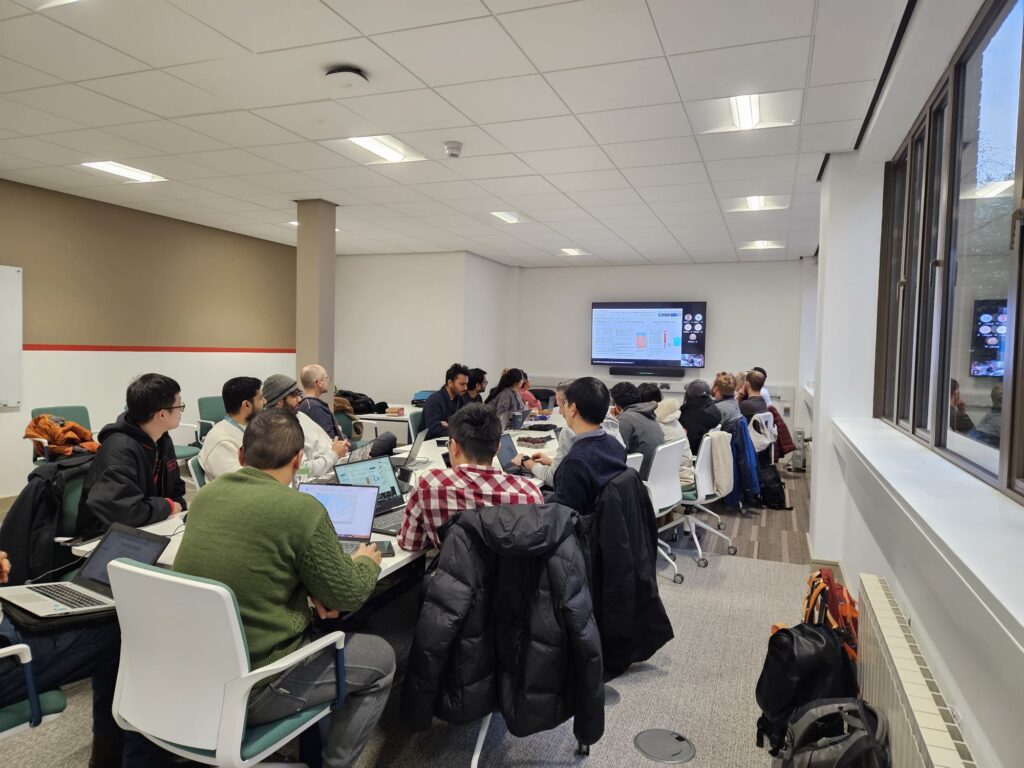
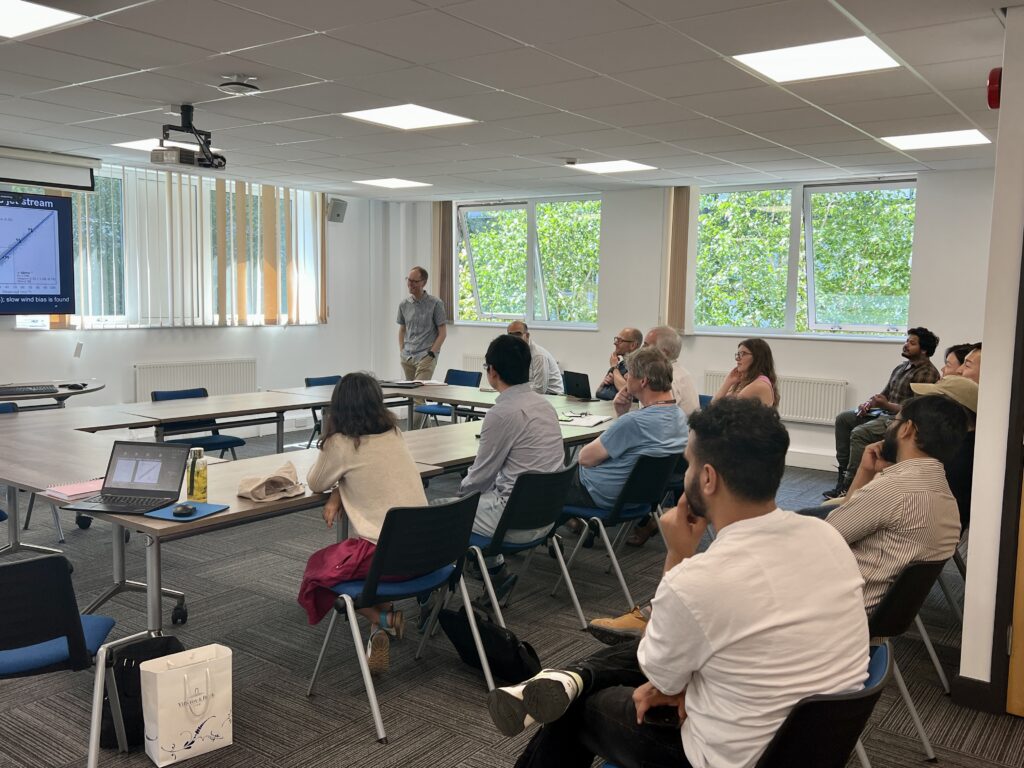
Seminars in 2024 - 2025
10th April 2025 - Dr Monika Markowska - Recurrent humid periods in central Arabia over the last 8 million years
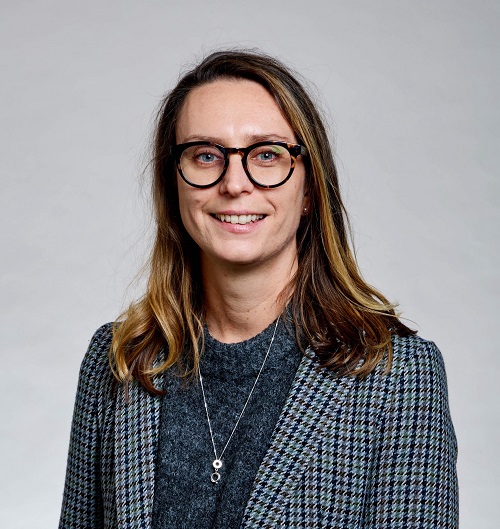
Monika is leading a Royal Society University Research Fellowship project investigating precipitation changes in global drylands. A particular focus is broadening our understanding of dryland hydroclimate by comparing and evaluating climate proxy and instrumental data, proxy-system modelling, developing novel techniques in quantitative temperature and rainfall reconstructions, and generating chronological methodologies across timescales from the modern to the Miocene. To do this, she and her team focus on investigating previous ‘warmer worlds’, like the Pliocene, to gain insights on the controlling mechanisms responsible for precipitation changes. Monika is particularly passionate about improving our understanding on how fragile and vulnerable dryland landscapes will respond to future climate change.
Title: Recurrent humid periods in central Arabia over the last 8 million years
The Saharo-Arabian Desert is the largest dryland barrier on Earth, stretching from western Sahara to the Thar Desert. The limited availability of water poses severe challenges to social stability and economic growth, endangering long-term sustainability and exacerbating the region’s vulnerability to climate change. Recent research suggests this barrier is a long term feature and has been in place for at least 11 million years (Ma). However, within the Saharo-Arabian Desert interior, fossil evidence from the Late Miocene and Pleistocene suggests the episodic presence of water-dependent fauna (crocodiles, equids, hippopotamids), sustained by rivers and lakes that are absent from today’s arid landscape. Here, we examine desert speleothems to identify recurrent humid phases over the past 8 million years. Further, the isotopic composition of both speleothem carbonate and fluid inclusion water suggests an aridification trend in Arabia from the Late Miocene to the Late Pleistocene. We suggest the long-term aridification trend resulted from a time-transgressive reduction in rainfall during humid intervals, coinciding with enhanced Northern Hemisphere polar ice cover during the Pleistocene. To identify external forcing driving humid phases and the resultant atmospheric dynamics, we compared used simulations from the HadCM3 isotope-enabled model during the mid-Piacenzian warm period (3.264 to 3.025 Ma). We examine model output from a series of sensitivity experiments with different orbital configurations allowing us to postulate the mechanisms responsible for the occurrence of humid episodes, with potential implications for other dryland regions at similar latitudes. Together, our approach unveils the long-term controls on Arabian hydroclimate and may provide crucial insights into the future climate variability.
6th March 2025 - Dr James C. White - Flows Hot and Cold: Examining long-term rapid river water temperature fluctuations across the conterminous US
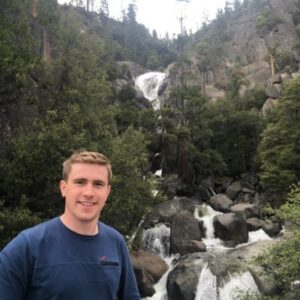
Dr James C. White is a research fellow in Geography, Earth and Environmental Sciences at UoB, and affiliate of the Birmingham Institute of Sustainability and Climate Action (BISCA). He is an interdisciplinary research scientist whose research broadly entails characterizing freshwater ecosystem dynamics and pressures in the context of global environmental change. He works closely with non-academic partners including water companies, charities and volunteer groups to deliver applied research on managing freshwater ecosystems to benefit wildlife and people.
Title: Flows Hot and Cold: Examining long-term rapid river water temperature fluctuations across the conterminous US
River water temperature (Tw) regimes are fundamental to freshwater ecosystem health, but rates of thermal change have been understudied despite its ecological importance. Rapid Tw increases (‘surges’) or decreases (‘plummets’) have been observed across individual catchments and short-term periods, but have been seldom characterized across broader space-time domains. Moreover, how multiple environmental drivers governing surges and plummets have been sparsely examined. To address this, we collated and cleaned high-resolution Tw data spanning the conterminous United States (US) between 2008-2023. We demonstrated the national-scale prevalence of surges (n = 6507) and plummets (n = 4787) that were recorded at 88 of the 102 monitoring stations. Both event types spanned freezing (snowmelt-fed systems) to extremely hot (>40 °C – geothermal influences) conditions. Successive transitions between rapid Tw warming and cooling occurred mostly in regulated systems, indicating dam-induced Tw volatility. Spatial and temporal analyses highlighted that surges were most frequently observed in the Southeast US and recurred every summer, while the same was true for plummets in the Southwest US; both were less prevalent in the West and Northwest US. Random forest models evidenced that surges were more sensitive to urbanisation, while plummets were strongly associated with minimum air temperature; both event types were driven by catchment properties like land cover, slope, soil properties and dam influences. This research provides a critical step in characterizing rapid Tw changes across vast spatial and temporal scales, as well key hydrometeorological conditions and catchment characteristics governing surges and plummets. Such insights are critical for informing evidence-based management solutions targeting extreme Tw variations and volatility.
28th November 2024 - Dr Philip Riris - Long-term population resilience: an archaeological perspective

Philip Riris is a Senior Lecturer in Archaeological & Palaeoenvironmental Modelling at the Institute for the Modelling of Socio-Environmental Transitions. Previously, he held a British Academy postdoctoral fellowship at the UCL Institute of Archaeology.
He earned his PhD in 2015 from the University of Southampton, focusing on long-term patterns of hunter-gatherer land use in northern Argentina. His regional specialism is in the archaeology and historical ecology of tropical South America, with a methodological focus on quantitative analyses and simulation. He has led and conducted fieldwork in Argentina, Brazil, Venezuela, Colombia, and Oman.
His two principal areas of research are currently: 1) past socio-ecological systems in the Atlantic Forest of Brazil, funded by the AHRC (AH/X002217/1), and 2) computational approaches to rock art and sacred landscapes. He maintains an especial interest in spatial analysis and agent-based modelling, drawing on physical geography, quantitative ecology, and complex adaptive systems to understand past human societies. Recently, he has also focused on the relationships between disturbance events and ancient population change.
Title: Long-term population resilience: an archaeological perspective
The record of past human adaptations can provide crucial lessons for guiding responses to crises in the future. This talk discusses a systematic, global comparison of humans’ ability to absorb and recover from disturbances through time. It is based primarily on a synthesis of archaeological data across a broad sample of prehistoric populations, spanning some 30,000 years of human history. Cross-sectional and longitudinal analyses of decline in population time–frequency data show that frequent disturbances, whether extrinsic or intrinsic, enhance a population’s capacity to resist and recover from later downturns. Land-use patterns are important mediators of the strength of this positive association: farming and herding societies are more vulnerable but also more resilient overall. The results indicate that important trade-offs exist when adopting new or alternative land-use strategies. Further study of this dynamic, for example through the formal integration of ancient genomics and archaeological population data is highlighted as a promising future direction for improving our understanding of the forces underwriting our species’ resilience.
25th November 2024 - Elizabeth Dingle - Evolving Flood Topographies: River – Related Hazards Downstream of the Himalaya
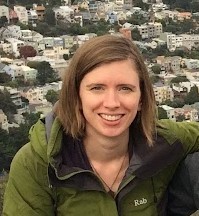
Elizabeth is currently a NERC Independent Research Fellow in the Department of Geography at the University of Durham. Prior to joining Durham, she completed a post-doc at Simon Fraser University (Canada) between 2018-2021, and a PhD at the School of GeoSciences, University of Edinburgh (2013-2018).
Title: Evolving Flood Topographies: River – Related Hazards Downstream of the Himalaya
River systems downstream of the Himalayan mountain front are typically described as shallow, aggrading alluvial river channels that are characterised by large sediment loads and high rates of channel migration. Flood hazard assessments in these regions are typically based on outdated and static digital elevation models (DEMs), which do not reflect dynamic river configuration or hydrology. Episodic changes in river course, sediment dynamics, and the distribution of flow downstream of large bifurcation nodes can modify the extent of flooding and ‘river-related’ hazards in these regions. Here, I will discuss a range of factors that control channel network stability and channel morphology on the Karnali River, in southern Nepal, and consider their effect on flood inundation extent, depth and hazard location.
19th November 2024 - Prof. Dr. Christian Laforsch - Microplastics in the Environment
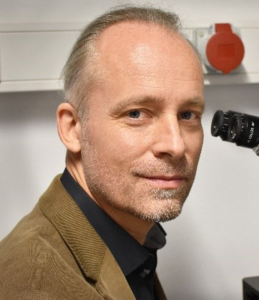
Title: Microplastics in the Environment
The ubiquitous contamination of the environment with microplastics (MP) and the associated potential risks perpetually attracts a great deal of public, political, economic and scientific attention. However, the problem is very complex, as MP represents a very heterogeneous group of particles with a wide range of chemical and physical properties, which also constantly change due to various environmental impacts and the resulting aging processes. This can lead to altered environmental behavior as well as to different biological effects. However, due to the myriad combinations of properties that MP exhibit in the environment, the study of aging, environmental behavior and effects is a tremendous challenge and requires an interdisciplinary approach that bridges traditional academic disciplinary boundaries. The CRC initiative on microplastics (SFB1357) aims therefore to gain a fundamental understanding of the processes and mechanisms that 1) condition biological effects of MP in limnetic and terrestrial ecosystems as a function of the physical and chemical properties of the particles, 2) influence the migration behavior of MP particles and 3) cause the formation of MP starting from macroscopic plastics, based on model systems for plastics, organisms, and environmental compartments. These findings provide a scientifically sound basis for assessing the environmental risks of MP, as well as for developing environmentally friendly plastics and processes to prevent the emission of MP into the environment. The presentation will highlight the state of the art in this young field of research, identify the key knowledge gaps, present the findings of the CRC, and show how they will contribute to solving this global issue.
15th October 2024 - Dr Charles de Lannoy - Separating and degrading environmental contaminants in drinking water and wastewater: innovations in membrane technologies for a changing world

Charles-François de Lannoy is an Associate Professor in Chemical Engineering and Adjunct Professor in Chemistry at McMaster University. His research group develops membranes, sorbents, and purification processes to eliminate trace environmental contaminants, capture carbon dioxide, and convert waste to value.
Prof. de Lannoy collaborates with many industry partners and First Nations groups to co-develop solutions to their water/wastewater challenges and environmental challenges.
He has published over 60 peer-reviewed publications in top journals in his field, he holds 4 patents and 4 provisional filings and has given over 75 talks and invited lectures at national and international venues. Before joining McMaster University, Charles was a visiting scholar in the Energy Materials & Systems Lab at the Palo Alto Research Center (PARC), working in conjunction with X (Google’s Moonshots Laboratory). Charles completed a Post-Doctoral Research Fellowship in the Department of Energy Resources Engineering at Stanford University.
He received his PhD from Duke University in 2014, in Civil and Environmental Engineering, with a Certificate in Nanoscience, and Honours BSc. in Physics from McGill University in 2008.
Title: Separating and degrading environmental contaminants in drinking water and wastewater: innovations in membrane technologies for a changing world
How can we extract valuable resources from waste effluents? How can we protect people from trace contaminants in our water? How can stop pollutants from entering our environmental systems? Is it possible to extract contaminants and turn that waste into value? Electrochemical purification technologies may hold some of the answers.
Separation (purification) technologies form the basis of most environmental and chemical processes, ranging from water treatment and desalination, to chemical catalysis, to gas purification. Membranes are the most efficient, cost effective, and safest purification technologies and they are replacing conventional technologies, while also being adopted across many new sectors. However, membranes do not treat the contaminants they remove. They simply concentrate those contaminants transporting the problem elsewhere (i.e. a landfill, a farmer’s field, or an incinerator). Moreover, a lack of contaminant specificity means that valuable contaminants (e.g. Au, Zn, various pharmaceuticals) from mining, industrial, or municipal wastewaters cannot be easily retrieved.
Prof. de Lannoy and his research lab have pioneered the field of electrochemical membrane reactors (EMRs) and applied these for environmental remediation, wastewater treatment, and resource recovery. These materials can variously perform conventional separations while also catalyzing reactions on their surface, and in many cases enabling separations that would not otherwise be possible. This talk will present the membranes being designed and the processes for their scalable production, in-situ separations and electrochemical degradations of contaminants of emerging concern, the mechanisms of degradation, and some new applications in resource recovery. The talk will close with a discussion of the current and future challenges for this environmental remediation technology, including the unknown by-products of reaction, their possible environmental/human impacts, and their broader adoption by industry.
19th September 2024 - Dr Nan Wu - Flocs as Vectors for Microplastics in the Aquatic Environment
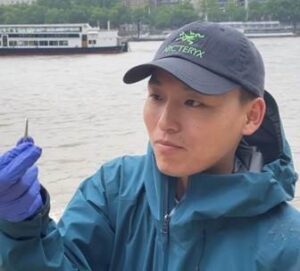
Dr. Nan Wu is a marine ecological modeller (postdoc) at the British Antarctic Survey, focusing on how microplastics influence the carbon biological pump in the Southern Ocean. Nan earned a PhD in Physical Geography from Queen Mary University of London, where his research centered on understanding how flocculation influences microplastic transport in aquatic environments. Nan has over seven years of research experience on microplastics in various environments, ranging from rivers to coastal and marine ecosystems. His work encompasses fieldwork, laboratory research, modeling, and meta-analysis.
Title: Flocs as Vectors for Microplastics in the Aquatic Environment
Microplastics (MPs, plastic debris < 5 mm) are a significant component of suspended particulate matter (SPM) in the aquatic environment. Flocculation is a critical process that controls the fate and transport of fine SPM (< 63 쭩 and associated MPs. Despite its importance in MP pollution management, understanding and predicting MP flocculation and hence transport remains challenging. We investigated the influence of MP properties and aquatic environmental conditions on MP flocculation and transport through a multi-disciplinary experimental, meta-analysis and modelling approach. Combining laboratory experiments and a meta-analysis, we explained the interaction mechanisms between MPs and flocs and identify MP and floc size as key parameters for predicting MP flocculation. Using the relationship between floc size and MP size, we derived a mathematical model (boundary curve) to predict whether MPs can be transported as flocs according to their sizes. Based on the boundary curve, we reconstructed the sedimentation trajectory for small buoyant microplastics (polyethylene) with marine snow aggregates (MSAs, marine flocs) in the ocean using a theoretical model. This demonstrated that buoyant MPs from the ocean surface need multiple cycles of aggregation and disaggregation with MSAs to get to the deep-sea sediments. This offers broad implications for the long-term management of MP pollution in marine environments.
Seminars in 2023 - 2024
11th July 2024 - Dr Annie Ockelford - Source or Sink? Exploring the role gravel bed rivers play in modulating the flux of microplastics in the environment
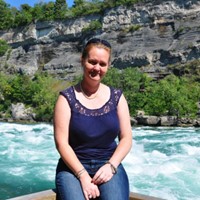
Dr Annie Ockelford is a lecturer in water and environmental engineering at the University of Liverpool. Prior to starting at Liverpool, Annie was a principal lecturer at the University of Brighton before spending two years working as the stakeholder engagement lead for the Flood Hydrology Improvements Programme within the Environment Agency. Working within interdisciplinary academic and non-academic teams, Annie’s research seeks to quantify the impact of changing water resources on river system functioning and quality including contaminant profiling and risk management and evaluation of the risks and benefits associated with nature-based solutions. She is also a passionate advocate of ensuring science and scientific outputs are available and fit for all where she has worked extensively to develop initiatives that make science accessible to under-represented or hard-to-reach audiences.
Title – Source or Sink? Exploring the role gravel bed rivers play in modulating the flux of microplastics in the environment
Microplastic burden in aquatic environments is increasingly recognized as being a threat to human and environmental health. To date, the focus has been on marine environments however, up to 80% of the plastics in the oceans are believed to have been transferred from river network.
As well as acting as a source, data from the sedimentological literature points towards river beds as being resilient sinks for contaminants including heavy metals, organic contaminants and microorganisms such as viral pathogens. Research has shown this to also be the case for microplastics, where they can accumulate in sediments at an order of magnitude higher than in the overlying water column.
In gravel bed rivers, active layer dynamics will likely drive the vertical exchange of microplastics and will therefore control whether the river bed acts as a source or sink of microplastics. In sand bed rivers, microplastic flux and the source to sink transition is likely governed by bedform dynamics. However, there remains a paucity of research on the exact mechanisms of microplastic transfer in these environments.
During this seminar I will discuss the findings from flume experiments and field surveys which serve to (i) elucidate upon the mechanisms responsible for controlling microplastic flux in gravel and sand bed rivers; (ii) identify the spatio-temporal variations in microplastic contamination in response to changes in flow regime and; (iii) identify the role microplastics play as vectors of microorganisms such as viral pathogens which are important for human health.
14th May 2024 - Dr Catherine Hirst - Role of soil water residence time on the fate of permafrost soil organic carbon
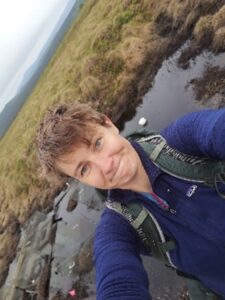
Dr Cat Hirst is an Assistant Professor in the Department of Earth Sciences at Durham University. Cat received a PhD from the Department of Geological Sciences at Stockholm University and was a postdoctoral researcher in the Earth and Life Institute at UCLouvain in Belgium. Cat is a geochemist. She applies her science toolbox to understand the impact of climate change and land-use change on soil and river constituents in high latitude (Arctic and Antarctica) and local environments.
Title – Role of soil water residence time on the fate of permafrost soil organic carbon
Catherine Hirst1, Allison Kelley2 Maëlle Villani3, Edward. A.G. Schuur2, Sophie Opfergelt3
1 Department of Earth Sciences, Durham University, UK
2 Center for Ecosystem Science and Society, Northern Arizona University, Flagstaff, AZ, USA
3 Earth and Life Institute, Université catholique de Louvain, Louvain-la-Neuve, Belgium
Permafrost is the rock, sediment or soil that remains at or below 0oC for more than two consecutive years. Most of the permafrost on Earth is found in the terrestrial Arctic. The Arctic is warming nearly 4 times faster than the rest of Earth’s surface1 and Arctic precipitation (mainly as rain) is projected to increase by 50 – 60 % by 21002. Consequently, the permafrost area is projected to decrease by 24 ± 16% by 2100 (RCP2.6)3 and high Arctic landscapes are predicted to become wetter4. Permafrost contains ~ two times as much carbon (C) as Earth’s atmosphere5. Upon permafrost thaw, organic C (OrgC) has different fates: it can be stored in soils without degradation or degraded in soils where the C is a) vertically released as greenhouse gases, b) laterally transported to rivers or c) retained in soils. A portion of the permafrost OrgC is associated with minerals. The fate of mineral associated permafrost OrgC (a, b or c pathway) depends (among other factors) on catchment hydrology. In this work, we hypothesise that the fate of mineral associated OrgC will depend on the soil water residence time. To test this hypothesis, we combine in-field hydrology measurements (precipitation and water table depth) with geochemical tools (concentrations, isotopes, microscopy, spectroscopy) on soil and river waters from a permafrost-dominated catchment with spatial and temporal variability in water residence time.
1Rantanen, M., Karpechko, A.Y., Lipponen, A., Nordling, K., Hyvärinen, O., Ruosteenoja, K., Vihma, T. and Laaksonen, A., 2022. The Arctic has warmed nearly four times faster than the globe since 1979. Communications Earth & Environment, 3(1), p.168.
3Chadburn, S.E., Burke, E.J., Cox, P.M., Friedlingstein, P., Hugelius, G. and Westermann, S., 2017. An observation-based constraint on permafrost loss as a function of global warming. Nature climate change, 7(5), pp.340-344.
2Bintanja, R. and Andry, O., 2017. Towards a rain-dominated Arctic. Nature Climate Change, 7(4), pp.263-267.
4Zhang, X., He, J., Zhang, J., Polyakov, I., Gerdes, R., Inoue, J. and Wu, P., 2013. Enhanced poleward moisture transport and amplified northern high-latitude wetting trend. Nature Climate Change, 3(1), pp.47-51.
5Hugelius, G., Strauss, J., Zubrzycki, S., Harden, J.W., Schuur, E.A., Ping, C.L., Schirrmeister, L., Grosse, G., Michaelson, G.J., Koven, C.D. and O’Donnell, J.A., 2014. Estimated stocks of circumpolar permafrost carbon with quantified uncertainty ranges and identified data gaps. Biogeosciences, 11(23), pp.6573-6593.
25th April 2024 - Dr Changqing Wu - Insights into the Health Impacts of Nanoplastics on Embryonic Development and Gut Health using a Chicken Embryonic Model

Dr. Changqing Wu is a Professor and a food toxicologist/food chemist at the University of Delaware. Dr. Wu has over 18 years of research in the field. Dr. Wu has established multiple bioassays to determine the toxicity and bioactivities of various chemicals from food or food waste products. Wu research lab has successfully evaluated the toxicity of nanoparticles, natural and newly synthetic phenlic compounds including phenolic-branched fatty acids , lignin compounds, food extracts or food waste. Wu research group tools include in silico molecular docking, in vitro (e.g. cell culture and bacterial mutant assay), and in vivo methods (e.g. chicken embryonic assay and chicken feeding trials).
Title – Insights into the Health Impacts of Nanoplastics on Embryonic Development and Gut Health using a Chicken Embryonic Model
Micro/Nanoplastics (MNPs) may be taken up by both humans and animals, via food and water. Recent evidence demonstrates the presence of MNPs in various human tissues — urine, blood, and placenta — as well as in human breastmilk. As published by World Health Organization in 2022, huge knowledge gaps exist regarding the health impacts of dietary nanoplastics on human. We leverage our research tools in food toxicity to study the dynamics of dietary nanoplastics and their health impacts, including its genotoxicity and developmental toxicity. In my talk, I will share our research platform, which uses a chicken embryonic model, and some recent findings on the different toxicities using model MNPs: 500 nm polystyrene (PS) nanoplastics and fluorescently labeled carboxylate-modified PS spheres with diameters of 20, 500, and 1000 nm. I will also discuss the many challenges of filling knowledge gaps about dieatary nanoplastics, such as the detection of nanoplastics in complex food matrices. We will need to use innovative interdisciplinary approaches to understand this emerging food contaminant.
9th April 2024 - Sam Cusworth - Microplastics in Agroecosystems: Past, Present and Future

Dr Cusworth is a recent graduate from Lancaster University, where he studied plastic use in agriculture as part of his PhD. His research focused on agriplastics, plastic pollution and the fate, behaviour and impacts of microplastics in agroecosystems. He is interested in the holistic assessment of micro- and nanoplastics in agroecosystems and how plastic particles impact the environment, but how they are also affected by the environment itself. In June, he will be working as a postdoctoral researcher on a project titled “Developing a framework for micro- and nanoplastics sampling and extraction from soil” as part of the ECAM group at ETH Zurich.
Title: Microplastics in Agroecosystems: Past, Present and Future
Since their invention, plastics have driven a revolution in behaviour in all aspects of our lives, including agriculture. In-use and as a waste material, plastics degrade and accumulate in agricultural systems. Accumulation of plastic pollution in agricultural systems has negative impacts on human health and agricultural productivity but little is known about concentrations of microplastics in soils. Utilising a Nile Red staining technique, microplastics from agricultural soils across the UK and from a historical archive were quantified using fluorescence microscopy. We highlight that agricultural soils are receptors of and reservoirs of microplastic pollution from agricultural and non-agricultural sources, a legacy which is growing over time. Given that microplastic concentrations in agroecosystems are amongst the highest recorded in current research, what does the future hold for agroecosystems and what research questions are still left unanswered?
8th February 2024 - Dr Sihan Li - Challenges and Future Outlooks of Water in High Mountains: too much, too little?

Title: Challenges and Future Outlooks of Water in High Mountains: too much, too little?
Mountains are natural water towers. They capture water from the atmosphere, storing it as snow and glacier ice, as well as in permafrost, wetlands, lake and river. The supply of water from mountains is crucial for numerous communities situated both along and downstream of the mountain ranges, supporting essential needs such as domestic consumption, irrigation, hydropower generation, and ecosystem services. Climate change is having rapid and dramatic impacts on the mountain cryosphere, and these cryospheric changes are spatially and temporally complex: snowfall amounts increasingly delivered by fewer, more extreme precipitation events; glacio-climatic feedbacks moderating glacier mass loss; and potential increase in landslides, infrastructure damage and release of greenhouse gases due to thawing of permafrost. Understanding the changes of the mountain cryosphere is vital for water resource management.
In this seminar, Sihan will discuss ongoing work over the Andes, assessing the sensitivity of water resources across the Andes to the changing supplies of snow and ice, through integrating observations with combined climate, ice-flow and hydrology models, across ten key glacierized catchments which span the climatological and latitudinal range of the Andes. This talk will also cover some of Sihan’s work on landslides during monsoon season over High Mountain Asia, and incorporation of this work into developing more detailed and specific Emergency Response and Preparedness Plans with humanitarian partners.
22nd November 2023 - David Tickner and Conor Linstead - How fundamental, applied and activist freshwater sciences can contribute to monitoring and recovery of the world’s rivers
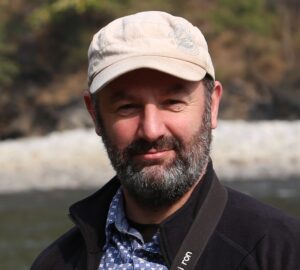
Title: How fundamental, applied and activist freshwater sciences can contribute to monitoring and recovery of the world’s rivers
If the world is to solve the problems of the Anthropocene, including rapid biodiversity loss, a combination of fundamental, applied and activist science will be needed. Fundamental science is primarily concerned with acquisition of new knowledge for its own sake. Applied science seeks to use knowledge to address real world challenges. Activist science aims to accelerate changes in policy and practice by combining knowledge with advocacy.
Nowhere is the biodiversity crisis more acute than in freshwater ecosystems. The WWF Living Planet Index has documented an 83% decline in freshwater vertebrate species populations since 1970, more than twice the decline on land or in the oceans. Meanwhile, water scarcity and pollution threaten human water security worldwide.
The UN Sustainable Development Goals promised action to address unsustainable water management. The recent agreement by 196 nations of the Kunming-Montreal Global Biodiversity Framework provides a platform for urgent action to halt and reverse biodiversity loss, including in “inland waters”. The private sector too is mobilising through initiatives such as the Alliance for Water Stewardship and the Courtauld 2030 Water Roadmap. But how can governments, companies and citizens know whether these promised actions and investments are resulting in healthier freshwater habitats?
In this seminar, we will outline how freshwater scientists have stimulated recognition of the twin freshwater biodiversity/water security crises and describe the responses from public and private sector actors. We will share insights from recent work to establish frameworks for monitoring river health at nested scales, building on fundamental and applied science. And we will share thoughts on how the academic community can equip a new generation of activist scientists that can drive a freshwater transition for the Anthropocene.
16th November 2023 - Andras Szeitz - Stream thermal regimes in subarctic Canada – what role does permafrost play, and at what scales?
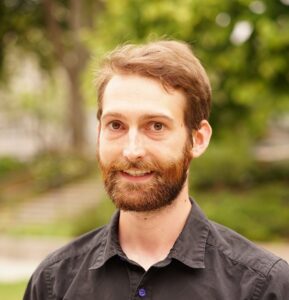
Andras Szeitz is a PhD Candidate at McMaster University, in Hamilton, Canada, under the supervision of Dr. Sean Carey. His PhD thesis is focused on investigating how stream temperatures in subarctic regions are influenced by and responding to environmental change, with field research conducted in Wolf Creek Research Basin, Yukon, Canada. In support of this research, Andras is here at the UoB on a research visit to discuss and collaborate on various aspects of stream temperature research, but focused on (1) numerical modelling of stream temperature energy balances, and (2) assessing the impact of climate change-induced environmental change on subarctic streams.
Title: Stream thermal regimes in subarctic Canada – what role does permafrost play, and at what scales?
Stream temperature is the master water quality variable, as it strongly influences stream physical and biological processes. Local environmental conditions can strongly influence stream thermal patterns, and landscapes in northern Canada are rapidly changing in response to climate change. This seminar will present the first regional-scale analysis of stream temperatures in subartic Canada (Yukon Territory), with a focus on the influence that permafrost plays on stream thermal regimes, along with some context on cold regions hydrology. This research sheds some light into the role that permafrost plays on stream temperature as a control on catchment storage and energy exchange, and how we might expect thermal regimes to change as permafrost degradation continues.
26th October 2023 - Dr. Gemma Coxon - Projecting droughts in rapidly changing human-water systems across the UK

Dr. Gemma Coxon is a senior lecturer at the University of Bristol and a UKRI Future Leaders Fellow. Her research focuses on understanding and predicting floods and droughts in changing environments through the simulation of water systems from local to continental scales. Gemma and her team work closely with communities, water companies, and regulatory bodies across the UK, and are currently involved in projects on (1) delivering a £38M investment in UK flood and drought research infrastructure (2) informing the development of new water supply infrastructure and (3) projecting floods and droughts in rapidly changing human-water systems.
Title: Projecting droughts in rapidly changing human-water systems across the UK
A reliable water supply is often taken for granted in the UK. However, decreasing water supply from anthropogenic climate change, coupled with increasing water demand from a growing population are projected to lead to frequent water shortages across the UK by 2050. This seminar will present recent advances in national-scale hydrological modelling and our understanding of human influences on river flows using a unique dataset of spatially explicit, time-varying abstractions and discharges across the UK. It will look ahead to discuss how we can better understand human impacts on river flows and droughts and provide national-scale projections of hydrological drought that consider both water supply and water demand.
18th September 2023 - Prof. Quentin Grafton - Too little, too much, too dirty
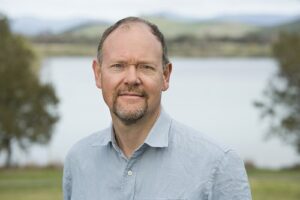
Quentin Grafton, FASSA, is Professor of Economics, Australian Laureate Fellow, Convenor of the Water Justice Hub at the Crawford School of Public Policy at the Australian National University. In April 2010 he was appointed the Chairholder, the UNESCO Chair in Water Economics and Transboundary Water Governance and between August 2013 and July 2014 served as Executive Director at the Australian National Institute of Public Policy (ANIPP). He currently serves as the Director of the Food, Energy, Environment and Water Network.
Title: Too much, too little and too dirty water
The world water crisis is manifest through ‘Too Much, Too Little and Too Dirty’ water at multiple scales from the local to the global. Understanding the key drivers and consequences of this water crisis, and who bears the biggest costs, is necessary to develop appropriate responses, at scale and over time. Using four framings: one, water stocks and limits; two, water rights and responsibilities; three, water values and prices; and four, green and grey water infrastructure, we review the challenges and possible responses. Using a water justice lens, we highlight the transitional and transformational pathways towards a safer and more just water future.
Seminars in 2022 - 2023
26th July 2023 - Dr. Delphis Levia - Tracking and tracing the transport and fate of atmospheric deposition by trees
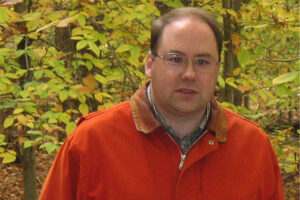
Dr. Delphis F. Levia is a Professor of Ecohydrology at the University of Delaware with academic appointments in the Department of Geography & Spatial Sciences (primary), Department of Plant & Soil Sciences (joint), and Department of Civil & Environmental Engineering (joint). He is Past Chair of the Department of Geography & Spatial Sciences and Founding Director of the GIScience and Environmental Data Analytics Programme. Prof. Levia’s research involves biosphere-atmosphere interactions with an emphasis on precipitation partitioning from both hydrological and biogeochemical perspectives. He has an international research programme and conducted research in Japan, Germany, Panama, and the United States, among other countries. He currently serves as a Series Editor for Springer’s Ecological Studies Series and an Associate Editor for Hydrological Processes (Wiley). Prof. Levia is a Humboldt Fellow, Japan Society for the Promotion of Science (JSPS) Invitational Fellow, and currently a Distinguished Visiting Fellow in the Institute of Advanced Studies at the University of Birmingham.
Title: Tracking and tracing the transport and fate of atmospheric deposition by trees
The transport and fate of atmospheric deposition and leachates through the tree canopy are poorly understood. This talk examines: (a) how solutes and particulates originating from the canopy and/or atmospheric deposition are transported over the woody frames of trees to the soil via branchflow and stemflow; (b) the infiltration of stemflow into forest soils; and (c) the drainage and routing of stemflow through soils. Results from both empirical and modelling work are presented. In conjunction with efforts to improve the efficacy of urban greening efforts in cities around the world, some implications of this work for the planning of green infrastructure are discussed.
15th June 2023 - Dr. David Lavers - Climate monitoring activities and forecast diagnostics at ECMWF
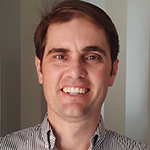
Dr. Lavers is a scientist at the European Centre for Medium-Range Weather Forecasts (ECMWF). His work focuses on the global water cycle and includes diagnostics of the ECMWF integrated forecasting system and climate monitoring. He has held previous positions at Scripps Institution of Oceanography, the University of Iowa, the University of Reading, and Princeton University. His PhD on seasonal hydrological prediction was from the University of Birmingham and the Centre for Ecology and Hydrology in the UK.
Title: Climate monitoring activities and forecast diagnostics at ECMWF
In this seminar, two main topics will be presented, namely climate monitoring and forecast diagnostics at the European Centre for Medium-Range Weather Forecasts (ECMWF). First, the climate monitoring activities undertaken as part of the Copernicus Climate Change Service (C3S) will be introduced. These activities include the publication of the monthly climate bulletins and the annual European State of the Climate report. Second, forecast diagnostics, and in particular the use of observations collected during the Atmospheric River Reconnaissance observational campaign in the northeast Pacific will be discussed. This topic is going to provide an overview of observations gathered from dropsondes, radiosondes, and ocean buoys and present some of the main results found with these data, including the latest research on the jet stream.
7th June 2023 Prof. Dr. habil. Mario Schirmer - Impact of Urbanization on Groundwater Recharge

Prof. Dr. habil. Mario Schirmer is hydrogeologist and geophysicist. He received his PhD at the University of Waterloo (Ontario, Canada) and his habilitation at the University of Tübingen (Germany). In 2008, Mario joined the Eawag, the Swiss Federal Institute of Aquatic Science and Technology, in combination with an associate professorship at the University of Neuchatel (Switzerland). In 2022, he became adjunct professor at Laval University (Quebec City, Canada).
Title: Impact of Urbanization on Groundwater Recharge
Groundwater, as the world’s most important reserve of available fresh water, is known to be affected by urbanization. Managing this resource in a sustainable way is critical for water resource management. Groundwater recharge rates in urban areas remain however still poorly understood and knowledge about these rates and their expected changes under increasing urbanization is therefore of primary importance. Our studies aim to give insight into urban groundwater recharge by performing water budget calculations for four different time periods for an urban study site in northern Switzerland. In order to take into account uncertainty in parameter values a Monte Carlo (MC) approach was carried out.
Our work highlights a strong positive correlation between groundwater recharge rates and the extent of the urban area. In detail, at the study site urban areas expanded from 6% in 1880 to 44% in 2009, leading to an increase in the mean groundwater recharge rate. However, the increase amount in recharge remains uncertain and varies between 29% and 67% depending on the parameter combination originating from the MC approach. Based on our water budget calculations, the transformation of natural landscapes into impervious areas leads to an increase in groundwater recharge rates due to the reduction of evapotranspiration that more than compensates for the increase in runoff. Furthermore, water main leakages contribute to an increase in recharge rates. Overall, we demonstrate that a better understanding of groundwater recharge changes in urban areas is required to move towards a sustainable water management. We hope that this example will encourage the hydrogeological community to pay more attention to urban groundwater recharge.
25th May 2023 - Dr. Pedi Obani - Sanitation, Human Rights and Governance: A Critical Perspective
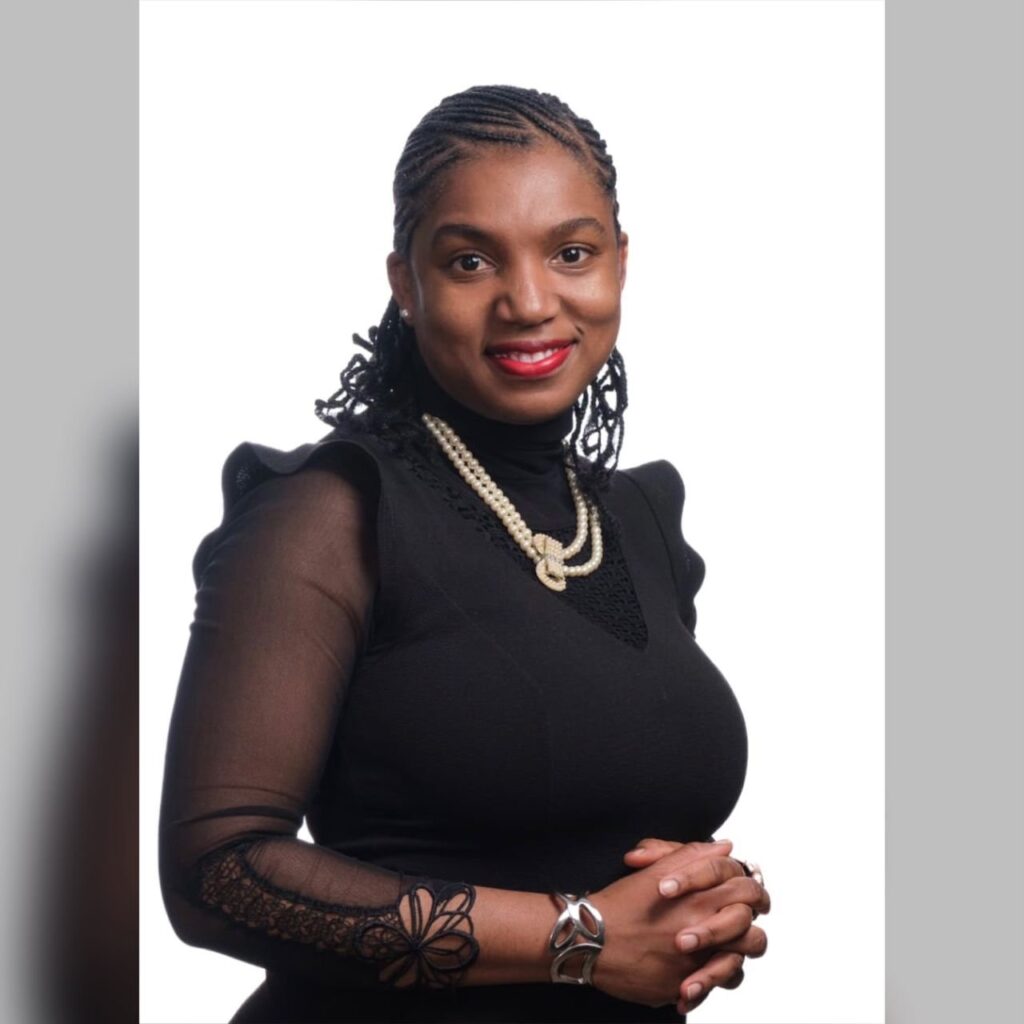
Dr. Obani is a renowned expert on critical approaches to legal studies on the human rights to water and sanitation, climate change governance and gender equality. She is an Associate Professor in the School of Law University of Bradford and a Visiting Research Fellow in Water, Security, Policy and Governance at University of Leeds. She is also an African Academy of Sciences Affiliate and a Research Fellow of Earth System Governance. Before starting her academic career, Dr. Obani qualified as a Barrister and Solicitor of the Supreme Court of Nigeria over 15 years ago.
Dr. Obani has a track record of producing high-quality research outputs and undertaking policy-oriented multi-disciplinary research projects with researchers and stakeholders at international and national levels. The African Studies Association UK awarded her the 2019 Mary Kingsley Zochonis Lecture Fellowship for her research on the human right to sanitation. In 2022, Dr. Obani was also recognised by the Institute for African Women in Law as a ‘Woman to Watch’ for her commitment to equal opportunities for women through research, advocacy, and wider engagement.
Title: Sanitation, Human Rights and Governance: A Critical Perspective
Sanitation has increasingly become a major development concern following the evolution of human civilizations into more complex and larger societies. Today, Africa is rapidly urbanising and most parts are plagued with poor access to basic services and related human rights violations. Sub-Saharan Africa, with a population of around 1 billion, has the highest proportion of people living without access to clean water and sanitation globally. The sustainability of interventions geared towards addressing the sanitation crisis will depend on the extent to which the gap in access is reduced for poor and vulnerable persons especially. This presentation reflects findings from a study on the challenges and prospects for advancing inclusive access to sanitation services in Nigeria, as a case study. It highlights salient contradictions and incoherence in the socio-legal construction of sanitation among various stakeholders, and in the regulatory approaches and governance instruments, to an extent that reinforces power asymmetries, dissuades the enforcement of sanitation regulation and compliance, and inhibits inclusive access.
17th March 2023 - Dr. Sophie Comer-Warner - Drivers of greenhouse gas fluxes and nutrient processing in coastal wetlands under global change
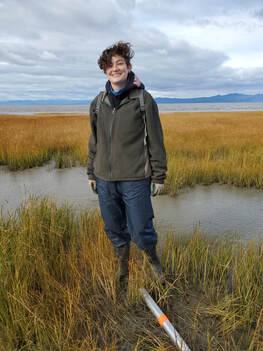
Dr. Comer-Warner is an aquatic biogeochemist working to understand effects of global change drivers on biogeochemistry in large river systems from agricultural streams to coastal wetlands. Her PhD investigated drivers of microbial metabolism, nutrient cycling and greenhouse gas production in agricultural streambed sediments, after which she focussed on effects of future global climate and land-use change on greenhouse gas fluxes and microbial processes in salt marshes during a Marie Sklodowska-Curie Global Fellowship. Sophie recently started as a BRIDGE fellow in water sciences with the University of Birmingham and the University of Illinois at Urbana-Champaign focussing on particulate pollution in large river systems and building collaborations between the two universities.
Title: Drivers of greenhouse gas fluxes and nutrient processing in coastal wetlands under global change
Coastal wetlands, such as mangroves and salt marshes, provide many ecosystem benefits including carbon sequestration and potential nutrient filtration. However, carbon and nitrogen cycling in these wetland soils may release greenhouse gases and partially offset some of the value of the sequestered carbon. Despite the importance of these coastal ecosystems they are under threat globally from multiple pressures including deforestation, aquaculture, sea level rise and high nutrient loading. This seminar explores the effects of global change on soil greenhouse gas fluxes and nutrient filtration potential of coastal wetlands due to different environmental drivers. Case studies from mangrove and melaleuca wetlands in Vietnam and salt marshes in Canada, U.S. and U.K. will be presented with drivers including restoration class, nitrogen loading and temperature to investigate some of the expected effects of future global change on these important coastal wetlands.
15th March 2023 - Prof. Dr. Julian Klaus - Flow and transport in the critical zone

Prof. Dr. Julian Klaus is a Geography Professor at the University of Bonn.
Title: Flow and transport in the critical zone
For decades, the overarching questions about catchment hydrological response have focused on where, when, and how streamflow is generated. This led the International Association of Hydrological Science to identify the need for “process-based understanding of hydrological variability and causality at all space and time scales” in their unsolved problems in hydrology. Key to this understanding is how water and solutes are transported within catchments. This seminar will present recent research with novel tracer and modelling approaches for a better understanding of runoff generation and solute transports in catchments. Particular focus will be on the use of isotope techniques in combination with hydrological models to reveal water ages in the critical zone. The seminar will combine isotope observation in streamflow and vegetation and show how these data are implemented in conceptual and process-based hydrological models. Last, an outlook is given on how this gained understanding on hydrological processes can be used to understand and predict catchment biogeochemical cycles.
3rd March 2023 - Dr Manish Kumar - Hydrological partitioning in contrasting tropical montane forests types in Eastern Himalaya

Manish is a field hydrologist with over 15 years of experience working on Himalayan ecohydrology and is a co-author of the recent IPCC AR6 chapter on Water. His PhD focused on quantifying plant-water relations in key tree species, the interactions between vegetation, soil, precipitation, and atmosphere, and its effects on spring and stream hydrology in the context of regional climate change in the Himalaya. He is currently working as the Knowledge Transfer Project (KTP) Research Associate with UoB and Proteus Instruments on developing a real-time water quality monitoring sensor. The project is funded by Innovate UK.
Title: Hydrological partitioning in contrasting tropical montane forests types in Eastern Himalaya
Studies describing runoff processes from different forest types are rare in tropical montane forests (TMFs). The study compares the hydrological functioning of three wet (3750–4900 mm precipitation) headwater catchments (temperate broad-leaved and sub-alpine conifer-mixed forests), ranging from 1800-4050 masl in Eastern Himalaya using a physically-based, data-driven mechanistic baseflow-separation filter developed by Furey and Gupta (2001). The study provides a mechanistic understanding of vegetation-streamflow interactions in wet high-elevation TMFs in Eastern Himalaya, one of the 30 global biodiversity hotspots and global 200 ecoregions of importance.
7th December 2022 – Prof Delphis Levia – Vegetation complexity: a precept of resiliency for water-stressed world

The seminar was delivered by Prof Delphis Levia, professor of Ecohydrology and founding director of GIScience and Environemtal Data Analytics Programme at the University of Delaware. Delphis presented “Vegetation complexity: a precept of resiliency for a water-stressed world”.
17th October 2022 – Dr Kirsten Thonicke - Modelling wildfires and functional diversity in global vegetation
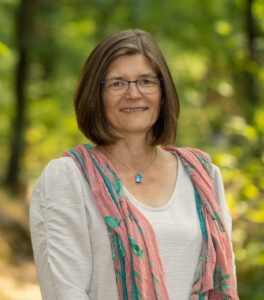
The seminar was delivered by Dr Kirsten Thonicke, Deputy Head of Research Department on Earth System Analysis and Working Group Leader on Ecosystem in Transitions of the Potsdam Institute for Climate Impact Research (PIK). Kirsten presented “Modelling wildfires and functional diversity in global vegetation.”
7th October 2022 – Dr Andreas Musolff – Nitrate unlimited? Understanding nitrate exports from Western European catchments
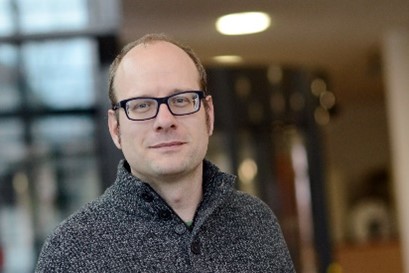
The seminar was delivered by Dr Andreas Musolff, of the Helmholtz Centre for Environmental Research – UFZ. Andreas presented “Nitrate unlimited? Understanding nitrate exports from Western European catchments.”
With specialities in catchment research amongst other topics, this was a great presentation with opportunities to discuss further work later in the day.
4th October 2022 – Dr Allan Beltran - The effect of floods on local electoral outcomes in England

Political debates of natural disasters’ impacts are important for potential policy changes and design of optimal policies. In this process, electoral signalling is critical as it could provide information as to what modifications to policies are needed to satisfy voters. By studying the effects of floods on local election outcomes in England during the 2002-2018 period and exploiting a shift to localised flood risk management responsibilities from 2010, we find that voters punish the incumbent party after a flood event but only if it occurs within a year of the election. Punishment is stronger if incumbent is party aligned with either national government or local authority (only in post-2010). There is no strong evidence that local councils aligned with the government are likely to spend more after a flood, giving little incentives for voters to reward incumbents aligned with the governments. Most of the decrease in the incumbent votes seemed to be captured by the protest party UKIP. Natural disasters being understood as failure of policies and decision-making, reinforced by other socio-economic contexts such as austerity and Brexit, could support protest parties and political changes.
28th June 2022 Prof Isabelle Durance - Unlocking change to sustain freshwaters
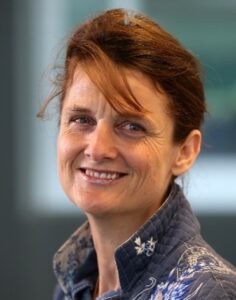
The seminar was delivered by Prof. Isabelle Durance, a professor and director of the Water Research Institute at Cardiff University. Isabelle presented “Unlocking change to sustain freshwaters.” The presentation builds on the work she has recently completed for the Esmee Fariburn Foundation and Sainsbury on the topic.
14th June 2022 – Dr Laura Richards – Geogenic Arsenic in circum-Himalayan Groundwaters: Distribution, Geochemical Processes and Remediation Approaches

The seminar was delivered by Dr Laura Richards, a Dame Kathleen Ollerenshaw Research Fellow at the University of Manchester. Laura presented “Geogenic Arsenic in circum-Himalayan Groundwaters: Distribution, Geochemical Processes and Remediation Approaches.”
10th May 2022 – Dr Shasha Han – Impacts of urbanisation on river flow in the UK

The webinar was delivered by Dr Shasha Han, a lecturer in physical geography who moved to GEES early in 2022. Shasha presented “Impacts of urbanisation on river flow in the UK?”
Seminars in 2021 - 2022
Prof. Harry Dixon; UK Centre of Ecology and Hydrology; “Innovation in operational water monitoring.“
Dr Emma J. Rosi; carry Institute of Ecosystems Studies; “Pharmaceuticals and personal care products as an agent of global change.“
Prof Laurant Pfister (WWD21); Luxembourg Institute of Science and Technology; “The rivers are alice: on the potential for living organisms as hydrological archives and tracers.”
Prof Christa Kelleher (WWD21); Syracuse University; “The pathways of water through urban landscapes.”
Prof Chelsea Rochman (WWD21); University of Toronto; “Microplastics in our watershed: sources, effects and local solutions.”
Prof Jan Seibert; University of Zurich; “Testing the waters – the value of crowd-based observations in hydrology.”
Dr Tahmina Yasmin; University of Birmingham; “A system-view approach for sustainable urban development – Adaptive governance towards delivering sustainable water resource management.”
Dr Faith Taylor; Kings College London; “Inventorying Covid-19 interventions in low-income urban settlements.“
Dr Arial Shogren; Michigan State University; “The stories rivers tell: Using aquatic ecosystem signals to detect change in Artic watersheds.”
Dr Maria Poca; Instituto de Matemática Aplicada San Luis; “Ecohydrological studies conducted in central Argentinean highlands and subcontinental studies.”
Dr Berta Bonet; University of Birmingham; “Freshwater ecotoxicology and global change: Different approaches to better understand pollutants effects in a changing environment. “
Mr Ben Howard; University of Birmingham; “Instream wood as a nature-based solution for nutrient pollution in natural waters.”
Mr Mohammad Wazne; University of Lyon; “Distribution of microplastics in riverbed sediment and consequences on bioturbation associated ecosystem processes.”
Prof Genevieve Ali; University of Guelph; “Managing agricultural watersheds through the lens of ecohydrological connectivity. “
Dr Dusan Materic; Utretch University; “Managing agricultural watersheds through the lens of ecohydrological connectivity. “